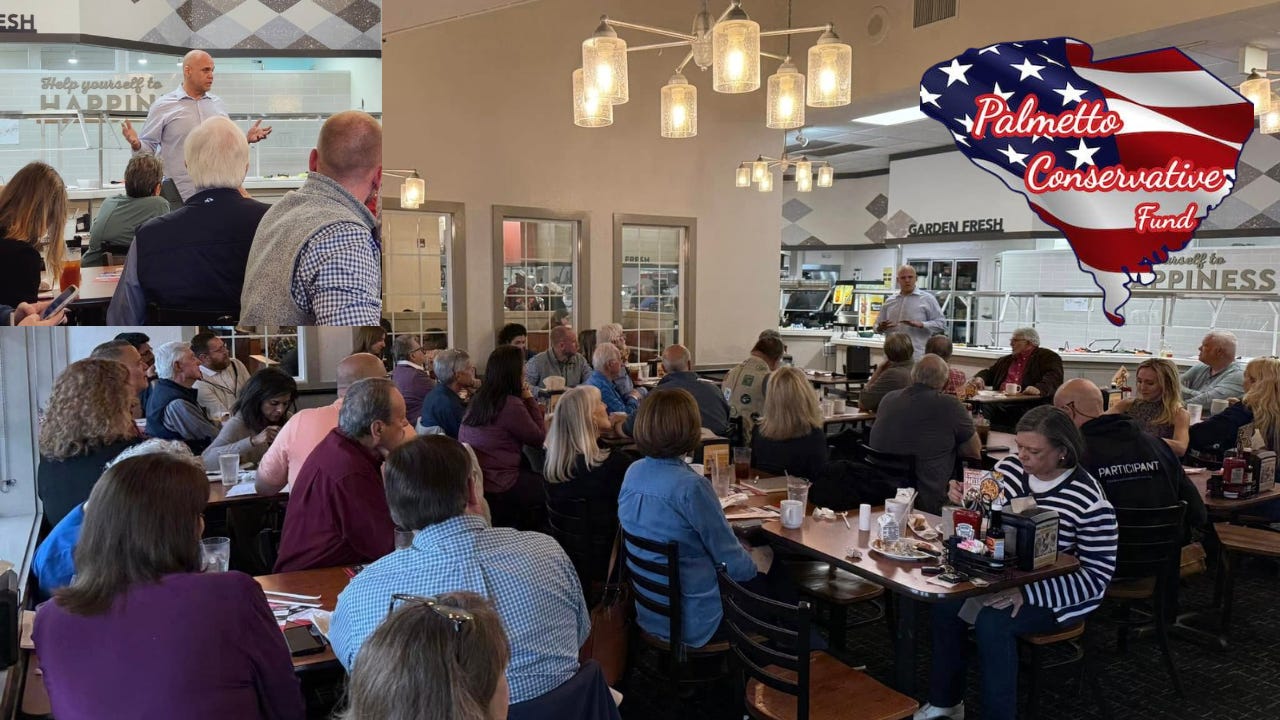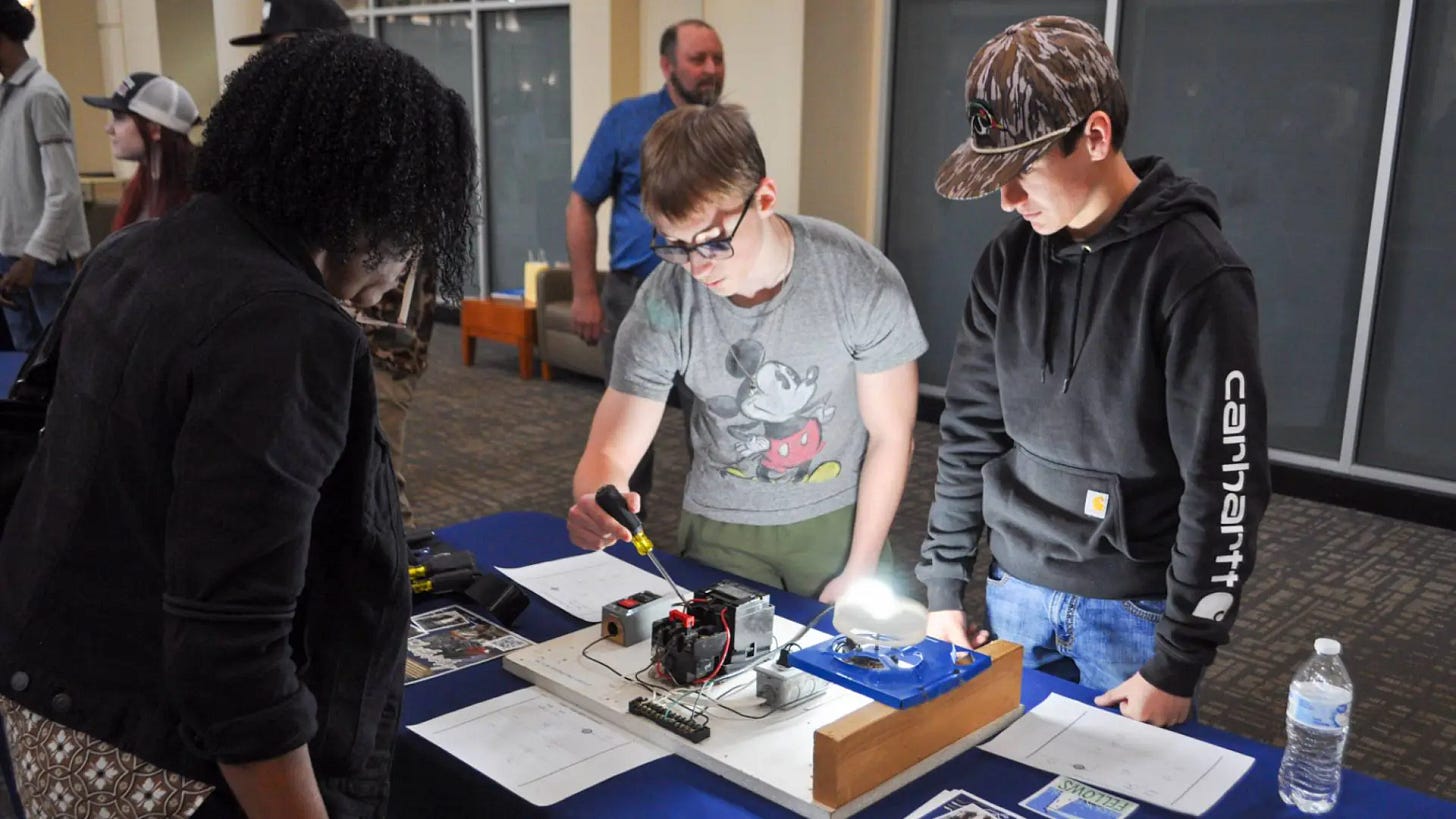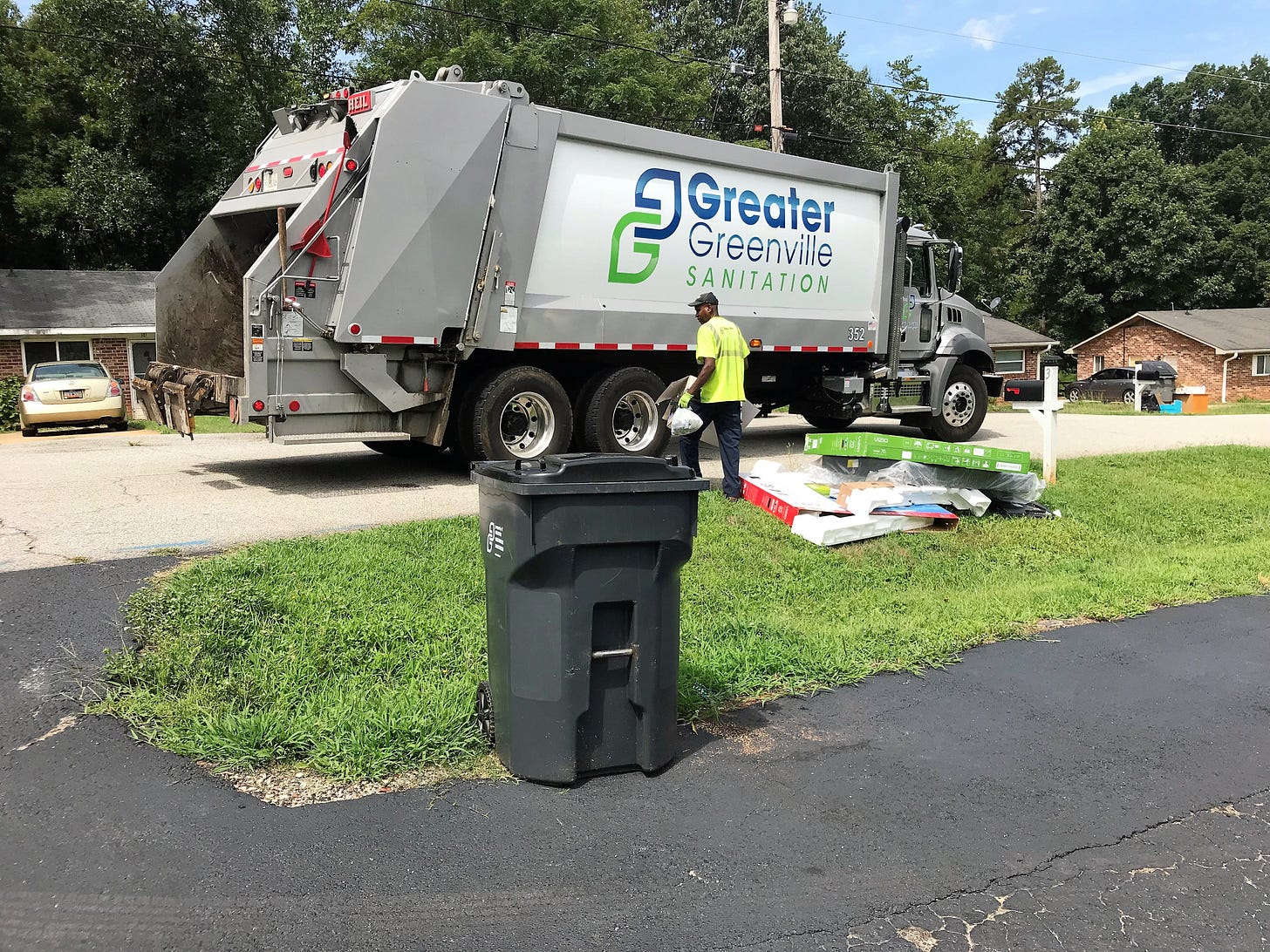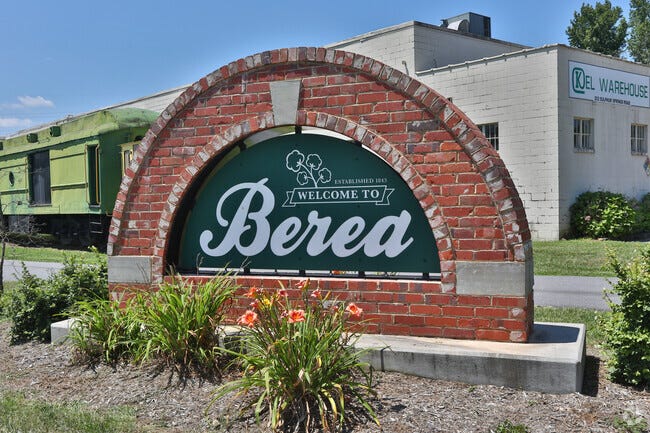Understanding Council’s Role in Development and Advocating for Greenville’s Future
Chairman Blount’s Newsletter 3-16-25
Upcoming Greenville County Meetings: March 17 - March 21, 2025
Below is a schedule of upcoming Greenville County meetings for the week of March 17 to March 21, 2025. Residents are encouraged to participate or view these sessions to stay informed about decisions affecting our county.
Council and Standing Committee Meetings
Monday, March 17
Zoning Public Hearing
• Time: 6:00 PM
• Location: Council Chambers, 301 University Ridge, Greenville
• Livestream: Watch here
Tuesday, March 18
Roads, Infrastructure, and Public Works Committee
• Time: 4:30 PM
• Location: Committee Meeting Room, 301 University Ridge, Greenville
• Livestream: Watch here
County Council Meeting
• Time: 6:00 PM
• Location: Council Chambers, 301 University Ridge, Greenville
• Livestream: Watch here
Community Meetings
Monday, March 17
Greenville County Subdivision Advisory Committee (SAC)
• Time: 9:30 AM
• Location: Committee Meeting Room, 301 University Ridge, Greenville
• Livestream: Watch here
Greenville Airport Commission
• Time: 11:00 AM
• Location: 100 Tower Drive, Commission Conference Room
Metropolitan Sewer Subdistrict Commission
• Time: 2:00 PM
• Location: 120 Augusta Arbor Way, Greenville
Glassy Mountain Fire Service Area
• Time: 4:30 PM
• Location: 2015 Highway 11, Landrum
Gowensville Fire District
• Time: 5:00 PM
• Location: 2201 W. Old Highway 14, Landrum
• Tuesday, March 18
Greenville County Museum Commission
• Time: 12:00 PM
• Location: 420 College Street, Greenville
Greenville Area Development Corporation (GADC) Finance Committee Meeting
• Time: 3:00 PM
• Location: Zoom Meeting
• Public Access: Email prastatter@greenvillecounty.org for Zoom link 24 hours prior to the meeting.
Wednesday, March 19
Brookfield Special Tax District Committee
• Time: 6:30 PM
• Location: F. W. Symmes Library, 1508 Pelham Rd., Greenville
Thursday, March 20
Unfit Structure Hearing
• Time: 10:00 AM
• Location: Committee Meeting Room, 301 University Ridge, Greenville
Greenville County Historic Preservation Commission
• Time: 12:00 PM
• Location: North Building - Committee Meeting Room, 301 University Ridge, Greenville
Sunbelt Human Advancement Resources (SHARE) Board of Directors
• Time: 12:30 PM
• Location: 254 S. Pleasantburg Drive, Greenville
Support documents related to the County Council and Council Standing Committee agendas are available for review in the County Council office or online at www.GreenvilleCounty.org
Remembering Former County Councilman Bobby Clayton Cook
I am saddened to share the passing of former Greenville County Councilman Bobby Clayton Cook, who passed away on March 12, 2025, at the age of 91. Mr. Cook dedicated more than three decades to public service in Greenville County, serving 12 years on the Greenville County Council and 16 years on the Mauldin City Council. Throughout his time in office, he played a key role in local governance, advocating for responsible growth, infrastructure improvements, and policies that strengthened Greenville’s communities.
His leadership extended beyond politics—he was an active supporter of local businesses, community initiatives, and the preservation of Greenville County’s heritage. Mr. Cook was known for his straightforward approach, always putting the interests of his constituents first and ensuring that their voices were heard in county decision-making.
A Deep Connection to District 19
Mr. Cook’s roots were firmly planted in Greenville County. He grew up in the mill communities of District 19, including the Monaghan area, which shaped his perspective on hard work, community values, and the importance of public service. His early years in these historic textile neighborhoods gave him a deep understanding of the working-class families who helped build Greenville.
He was a proud graduate of Parker High School (where he got his PHD), a historic institution that served generations of students in Greenville before its closure in 1985. His education and upbringing instilled in him a commitment to service, which he carried throughout his life.
Mr. Cook’s legacy will live on through the countless lives he touched and the improvements he helped bring to Greenville County. We extend our deepest condolences to his family and friends as they mourn his passing.
If you knew Mr. Cook and would like to extend your condolences to the family, you can find information on visitation, celebration of life, and other ways to pay respects by clicking HERE.
A Great Morning at the Back-To-Basics Breakfast
This past Saturday, I had the privilege of attending the Back-To-Basics Breakfast hosted by the Palmetto Conservative Fund at Golden Corral in Cherrydale. It was an incredible event with a fantastic turnout, and I truly appreciated the opportunity to speak, as well as hear from so many engaged citizens about the issues that matter most to them.
I was honored to speak alongside Lynda Leventis-Wells of the Greenville County School Board, where we provided updates on key activities happening within both Greenville County government and our school system. I primarily focused on how County Council will look different moving forward in terms of transparency and accountability. More importantly, I valued the conversations with attendees, who shared their thoughts, concerns, and perspectives on government operations and local policies. These discussions are vital in shaping the future of our community, and I am grateful for everyone who took the time to attend and engage.
Events like these remind me why I serve—to ensure that the voices of our citizens are heard and that we work together to build a stronger, more responsive government. I’m already looking forward to the next Back-To-Basics Breakfast and hope to see even more of you there! Stay tuned for details on the next event, and thank you to everyone who made this gathering such a success.
Kicking Off the Greenville County Citizens Academy
Last week I had the privilege of attending the first day of the Greenville County Citizens Academy. The room was filled with neighbors from across the county eager to learn how our local government operates. As a Council member, there’s nothing more encouraging than seeing people take an active interest in their government. It set a positive, energetic tone for the weeks ahead and reminded me why we started this program in the first place.
I was thrilled to see that almost half of the Academy’s participants were from our very own District 19! Seeing so many familiar faces from our community stepping up to learn and engage made me incredibly encouraged and proud. This strong showing isn’t just a point of pride for us – it’s going to be impactful for our district and the county as a whole. You can bet those folks will bring their knowledge back to their neighborhoods, friends, and families. That means more informed conversations at local meet-ups, more people who know how to navigate county services, and a ripple effect of engagement that benefits everyone in Greenville County.
One of the big reasons the County launched the Citizens Academy is because equipping residents with knowledge of how government works is vital for building a trustworthy council and government. When you understand what happens behind the scenes – how decisions are made, how budgets are crafted, how services are delivered – it demystifies local government. Transparency and education turn confusion or skepticism into confidence. I’ve always said that an informed community is a stronger community. When folks see firsthand the care and effort that goes into serving the public, it builds trust in those of us on Council and in county staff. It also empowers you as citizens to ask great questions, share ideas, and hold us accountable in a constructive way. In short, knowledge breaks down barriers and turns “us vs. them” into we – one team working together to make Greenville County the best it can be.
To those who are participating: thank you for investing your time in this – our community will be better for it. And for those who couldn’t join this inaugural class, don’t worry – there will be more opportunities to get involved in the future! I highly encourage you to consider applying for a future Citizens Academy session or finding other ways to engage with your local government. Whether it’s attending council meetings, volunteering on a board, or jumping into the next Academy class, your involvement is what makes our district and county strong.
Importance of Supporting Our Trade Community for Greenville County’s Sustainability
On March 15, 2025, Greenville County proudly hosted the South Carolina Youth Skilled Trades Summit, an event that honored the achievements of the Harbor Freight Fellows. Sponsored by Big Picture Learning, Harbor Freight Tools for Schools, and the Harbor Freight Fellows Initiative, the summit celebrated young individuals committed to mastering skilled trades.
The Significance of Supporting Our Trade Community
Investing in and encouraging our trade community is vital for Greenville County’s local sustainability for several reasons:
• Economic Growth and Job Creation: Skilled trades are the backbone of our local economy. As Greenville experiences significant growth in construction and manufacturing industries, the demand for skilled tradespeople continues to rise, creating ample job opportunities and supporting economic development.
• Community Resilience: Skilled trades offer resilience in an ever-changing economy. These professions are less likely to be outsourced or automated, ensuring a steady demand for local talent.
• Environmental Sustainability: A well-trained trade workforce is essential for implementing and maintaining sustainable practices. Skilled tradespeople play a crucial role in upgrading aging infrastructure and facilities, which is key to reducing energy consumption and operating costs, yielding immediate returns on investments in sustainable facilities management.
By investing in our trade community, Greenville County can ensure a sustainable future that balances economic growth, environmental stewardship, and social well-being.
Chairman’s Corner: The Future of Greater Greenville Sanitation
As Chairman of Greenville County Council and the elected representative for District 19, I am committed to ensuring that the citizens of our county receive reliable, efficient, and affordable public services. Today, I must bring to your attention a piece of legislation moving through the South Carolina General Assembly that could fundamentally disrupt sanitation services for thousands of residents and businesses.
Let me be clear—I am not here to debate the merits of the proposed legislation itself. I fully understand that the Greater Greenville Sanitation District (GGS) was originally created as a state initiative, and I respect that the General Assembly has the authority to examine whether its operations remain within the boundaries of that agreement. If there are legitimate concerns about GGS exceeding its original scope, then a conversation should be had about how to address those concerns. However, dissolving the district outright—without consulting local leaders, without a transition plan, and without exploring alternative solutions—is an extreme measure that could leave thousands of residents facing uncertainty in their waste collection services. There must be a way to seek common ground without taking such drastic action.
What’s at Stake?
Greater Greenville Sanitation is more than just a trash collection service. It provides bulk waste collection, yard waste removal, and essential sanitation services that many private waste companies do not offer. For decades, it has ensured consistent, cost-effective service for approximately 60,000 residents and businesses, including underserved areas where private companies might not find it profitable to operate.
If this legislation passes, here’s what could happen:
• Higher Costs for Residents – Private waste companies set their own rates, which could result in increased service fees. The efficiency and cost-sharing model of GGS could be lost, meaning households and businesses may pay significantly more.
• Disrupted Service & Reduced Coverage – Private haulers are not required to offer bulk waste collection, yard debris removal, or other services currently provided by GGS. This could lead to uncollected waste, littered streets, and declining sanitation standards.
• Job Losses & Economic Impact – GGS employs approximately 114 full-time workers, all of whom could lose their jobs if the agency is dissolved. These individuals contribute to our community, and their livelihoods should not be discarded without a plan.
• No Clear Contingency Plan – The most alarming part of this situation is that the legislation was introduced without prior discussion with County Council or an assessment of what would replace GGS. If the bill passes, residents may face confusion, delays, and uncertainty about who will collect their waste and at what cost.
Presenting a Resolution at Tuesday’s Council Meeting
In response to these concerns, I will be presenting a resolution at Tuesday’s County Council meeting to formally express opposition to this legislation and highlight the potential negative consequences for our residents. I want to ensure that every citizen understands what this resolution is about and why it matters to our community.
Key Points from the Resolution
• The proposed bills (H. 4002 and H. 4003) would dissolve GGS or significantly alter its operations, potentially leading to higher costs and reduced services for residents. See the bill that would dissolve the entire operation HERE
• If GGS is dissolved, its current customers will be forced to negotiate service with private haulers or take their own waste to landfills, which could be costly and inconvenient.
• The proposed changes could result in uncollected trash, yard waste, and debris across the county, particularly in underserved areas.
• County Council was not consulted before this legislation was introduced, despite its significant impact on Greenville County residents.
You can review the full resolution HERE
My role as a public servant is to advocate for what is best for the people of Greenville County, regardless of political considerations. I firmly believe that changes of this scale should be carefully planned, transparently communicated, and designed to serve the public interest.
I urge residents to stay informed and engage with their elected representatives to ensure that any decision about the future of GGS is made with the people’s best interests at heart. If you have concerns or opinions on either side of the topic, now is the time to voice them. Your services, your rates, and the cleanliness of your community could all be on the line.
Rest assured, I will continue to fight for accountability, transparency, and practical solutions that protect the well-being of our county. If changes must be made, they should be made responsibly—with input from the community and a clear path forward.
Councilman’s Corner: Council’s Role in Guiding Development and Zoning
Greenville County Council plays a big role in shaping local development through zoning laws and planning decisions. The County Council doesn’t build houses or shopping centers itself – instead, it sets the rules that guide where and how development can happen. These rules (known as zoning ordinances) must follow South Carolina’s state laws on planning. Council members work with the county’s planning commission and staff to update zoning maps, consider rezoning requests, and make sure new growth fits the community’s comprehensive plan. In short, County Council creates the framework for development, aiming to balance growth with residents’ needs.
What County Council Cannot Do (Under State Law)
A common misconception is that County Council can simply “stop” any development it doesn’t like. In reality, state law and property rights limit what Council can do. For example, if a piece of land is already properly zoned for a certain use (say, apartments or a subdivision) and a developer meets all the requirements, Council cannot arbitrarily block that project. Doing so could violate the property owner’s rights. Both the U.S. and South Carolina Constitutions protect landowners from government actions that are overly restrictive on the use of their land . In other words, preventing a landowner from any reasonable development of their property could be seen as an unlawful “taking” of property, which is illegal without just compensation .
South Carolina law also lays out strict procedures for how zoning can be changed or used. County Council cannot impose a sudden ban or moratorium on certain types of housing by a simple motion or because of public pressure. In fact, a South Carolina court struck down one council’s attempt to halt all new duplex and apartment construction by resolution – the court said you can’t suspend development rights that are granted by a zoning ordinance unless you go through the proper legal process of passing a new ordinance . This comes from the Simpkins v. City of Gaffney case, which basically told local governments: you can’t press “pause” on development that’s allowed under current zoning unless you follow the law to officially change that zoning.
Moreover, once a development is approved or underway, state law gives the developer certain vested rights. The South Carolina Vested Rights Act of 2004 ensures that if a landowner has an approved site-specific development plan, they can proceed with that plan for a fixed period (initially two years, with possible extensions) even if rules change later. In plain English, this means a new County Council can’t simply revoke a previous approval on a whim. The law protects developers from retroactive zoning changes in most cases. So, if a past Council legally approved a project, the current Council usually cannot just cancel it because they’ve changed their minds or neighbors object – not without risking a lawsuit.
To sum up, Council cannot:
• Violate property rights by denying a landowner all reasonable use of their land (that’s unconstitutional).
• Ignore state procedures for zoning changes – any change must be done by ordinance with proper process, not by sudden action.
• Retroactively stop or undo approved projects except in special cases allowed by law (thanks to developers’ vested rights).
What County Council Can Do to Shape Growth
While there are important limits on blocking development, County Council does have tools to guide growth in line with community wishes. Council controls zoning rules, meaning it can vote to change the zoning map or ordinance for future development – as long as it follows the legal process (public hearings, notices, and an ordinance vote) . For instance, if residents are worried about too many apartments in one area, Council can consider downzoning some land (changing the zoning to a lower density) or updating the comprehensive plan to reflect the community’s vision. They just have to ensure any changes are done fairly and legally. Council can also attach reasonable conditions to rezonings (like buffers, traffic improvements, etc.) to address community concerns when approving a new project.
Another thing Council can do is say “no” to rezoning requests that don’t align with the community’s plans. If a developer wants to change a property’s zoning to allow something neighbors oppose, the Council is not obligated to approve it. They have discretion to deny rezoning if it’s not in the public interest or conflicts with the county’s comprehensive plan. The key is that decisions must be reasonable and not arbitrary – Council can’t reject a project for illegal reasons, but it can weigh factors like traffic, infrastructure, and community input when voting.
Council members can also propose new policies (within the scope of state law) to manage growth – for example, strengthening development regulations, encouraging development in certain areas and not others, or even temporary moratoriums if done by the book (limited in time and purpose, per the guidelines set by cases like Simpkins).
In short, County Council can guide where growth goes and what it looks like – they just have to do it by setting the rules in advance, rather than stopping projects at the last minute. This means working proactively: updating zoning policies, listening to citizen input on the front end, and making sure new development follows the community’s comprehensive plan (which Council adopts with public input).
Setting the Record Straight on Berea Multifamily Development
Let’s address a rumor making the rounds in our community: the idea that I am responsible or “allowed for” new multifamily (town home/apartment) developments in Berea. This claim has been pushed by someone in our community, and it’s simply not true. I want to clear up the confusion so everyone has the facts.
Here’s what really happened in Berea: Before I took office, several multifamily projects had already been slated for that area. Those developments were either approved under previous Councils through rezoning or have begun because of the existing zoning that allows for the development. When I came into office, residents of Berea were already seeing a surge of apartment construction and were understandably upset. I heard that public outcry loud and clear.
As a result, I have NEVER approved a new multifamily development in Berea during my time in office. Every time a proposal for apartments in Berea has come up on my watch, I have stood with the community’s wishes. In fact, given the backlog of projects okayed or permitted before I was elected, I felt Berea needed a breather! I have actively pumped the brakes on any new multifamily rezoning in that community because that’s what my constituents are asking for. So if you’ve heard someone accusing me of “bringing in” more multifamily housing to Berea, know that the opposite is true – I have been the one pushing back and preventing many more that would have been developed by now.
At the end of the day, my guiding principle is simple: make sure growth happens in a way that the people of our community want. While I can’t wave a magic wand to stop every development (especially those allowed by law), I can and do fight for the community’s vision at every turn. Whether it’s voting “no” on rezonings that don’t fit what neighbors envision, or championing updates to our zoning plans to better manage growth, I am always checking back to “Is this what the people I represent want?” That’s the question behind every vote I cast.
County Council’s job involves balancing property rights with community interests – and it isn’t always easy – but I believe the people’s voice should lead that balancing act. I will continue using the tools at my disposal (policy changes, responsible planning, and yes, saying “no” when necessary) to make sure development in Greenville County follows the will of the people as closely as possible. It’s a promise I take seriously, and you gladly fact check me on that by looking at my voting record. Growth is inevitable in our area, but by working together and sticking to our principles, we can guide that growth in the right direction!
As we move forward, there’s no doubt that Greenville County is experiencing a pivotal period of strained growth and change, but also hope and opportunity. As Chairman, and alongside my fellow Council members, my commitment remains to keep you informed, engaged, and involved in the decisions shaping our community. We are actively developing new procedures and protocols to enhance transparency and public participation in ways that have never been seen before in our local government.
Your voice matters, and your involvement is what makes this county strong. Thank you for the trust you’ve placed in us to serve you—it’s an honor to work on your behalf every day.










For anyone interested, last week I decided to post weekly Congressional/Senate recorded votes, for each week they are in session. Unfortunately I don't have time to do state and local levels too.
https://open.substack.com/pub/conservativecontrarian/p/south-carolina-congressional-votes-cbc?r=982y8&utm_medium=ios
As a resident of the Sans Souci area, I’m quite dismayed by the potential dissolution of our Greater Greenville Sanitation District described in your newsletter. Trashy streets are already an issue in this area and this can only make it worse. I don’t understand why this was proposed seemingly out of the blue just one month ago nor why the “Greenville Delegation” were in favor of it. Do they not live here too? Thank you for your resolution. I surely hope it has some effect on the Senate vote, but it’s moving so fast, it feels like a done deal.